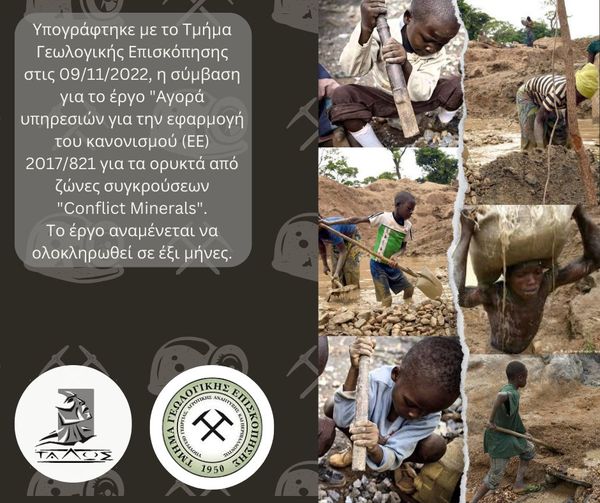Signed with the Geological Survey Department on 09/11/2022, the contract for the project “Purchase of Services for the Implementation of Regulation (EU) 2017/821 on Conflict Minerals”. The project is expected to be completed in six months.
RTD Talos responded to the invitation of the Department of Geological Survey to participate in the tender for the provision of services for the purposes of harmonization of the European Regulation (EU) 2017/821 on minerals from conflict zones – “Conflict Materials”
Natural mineral wealth in conflict-affected or high-risk areas can become a source of conflict if the proceeds fuel the outbreak or continuation of violent conflict, undermining efforts towards development, good governance and the rule of law. In these areas, breaking the link between conflict and illegal exploitation of minerals is vital to ensuring peace, development and stability.
Human rights violations are common in resource-rich, conflict-affected and high-risk areas, and may include child labour, sexual violence, disappearances, forced relocation and the destruction of ritual or cultural sites and sites. importance.

The European Union is actively involved in an initiative of the Organization for Economic Co-operation and Development (OECD) to promote the responsible sourcing of minerals from conflict areas, which has led to a multi-stakeholder government-supported process resulting in the adoption of guidelines OECD Due Diligence Guidelines for Responsible Management of Mineral Supply Chains from Conflict and High-Risk Areas (“OECD Due Diligence Guidelines”).
The OECD Due Diligence Guidelines aim to promote specific due diligence practices at the supply chain level when businesses are sourcing from areas of conflict and instability.
The concept of responsible sourcing of materials is mentioned in the updated OECD Guidelines for Multinational Enterprises and is aligned with the UN Guiding Principles on Business and Human Rights.
According to the OECD Due Diligence Guidelines, supply chain due diligence is an ongoing, proactive and complementary process through which economic operators monitor and manage their purchases and sales to ensure that they do not contribute to in conflicts or the adverse consequences of such conflicts.
Independent audits of due diligence practices in an economic operator’s supply chain ensure reliability for the benefit of economic operators and contribute to the improvement of due diligence practices.
European Union Regulation (EU) 2017/821 establishes an EU system for supply chain due diligence, which seeks to:
to ensure that EU importers of tin, tungsten, tantalum and gold (3TG) meet international responsible sourcing standards set by the Organization for Economic Co-operation and Development (OECD)
– ensure that smelters and refiners globally and at EU level source 3TG responsibly;
– help break the link between conflict and illegal mineral exploitation;
– help put an end to the exploitation and abuse of local communities, including mine workers, and support local development.
The project concerns the implementation of REGULATION (EU) 2017/821 OF THE EUROPEAN PARLIAMENT AND OF THE COUNCIL of 17 May 2017 on the determination of due diligence obligations in the supply chain of EU importers of tin, tantalum and tungsten, their ores, as well as gold, ( also referred to as 3TG) originating from conflict and high-risk areas.
